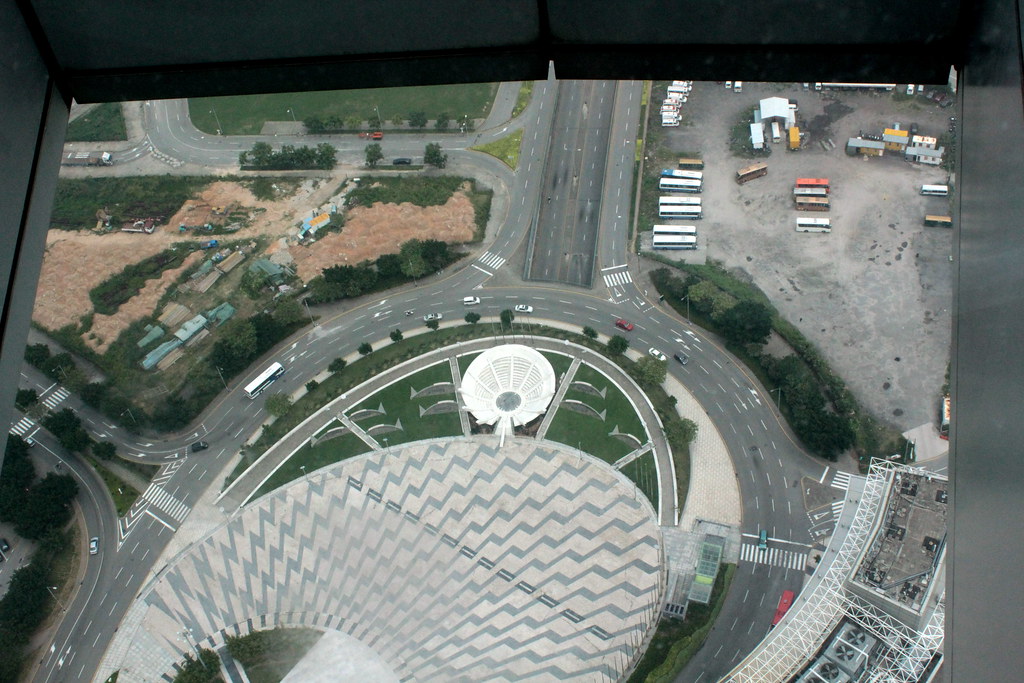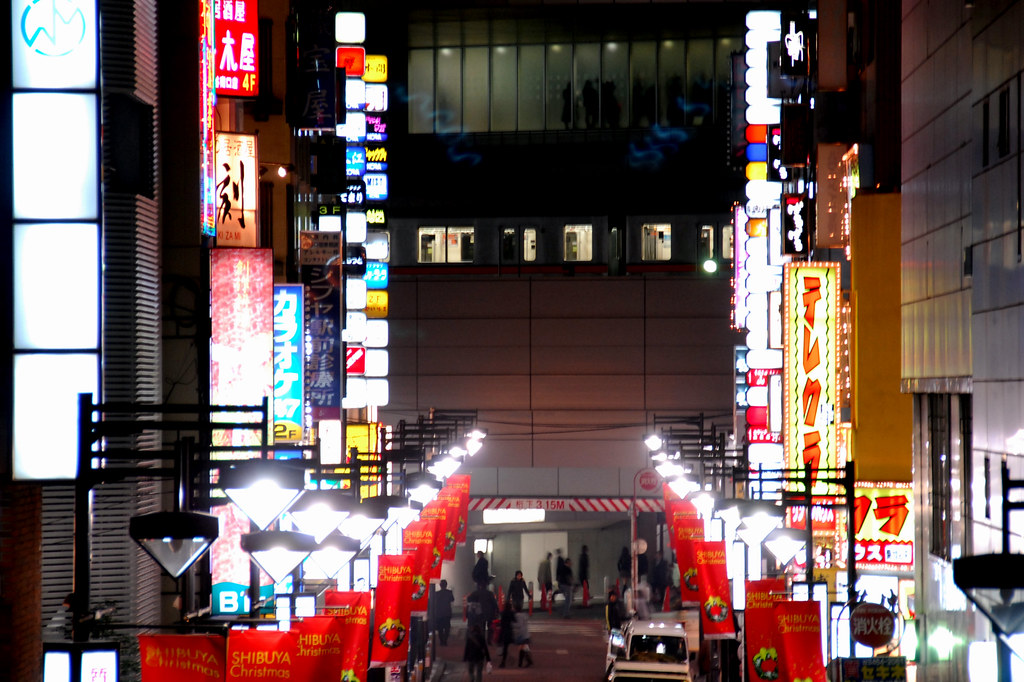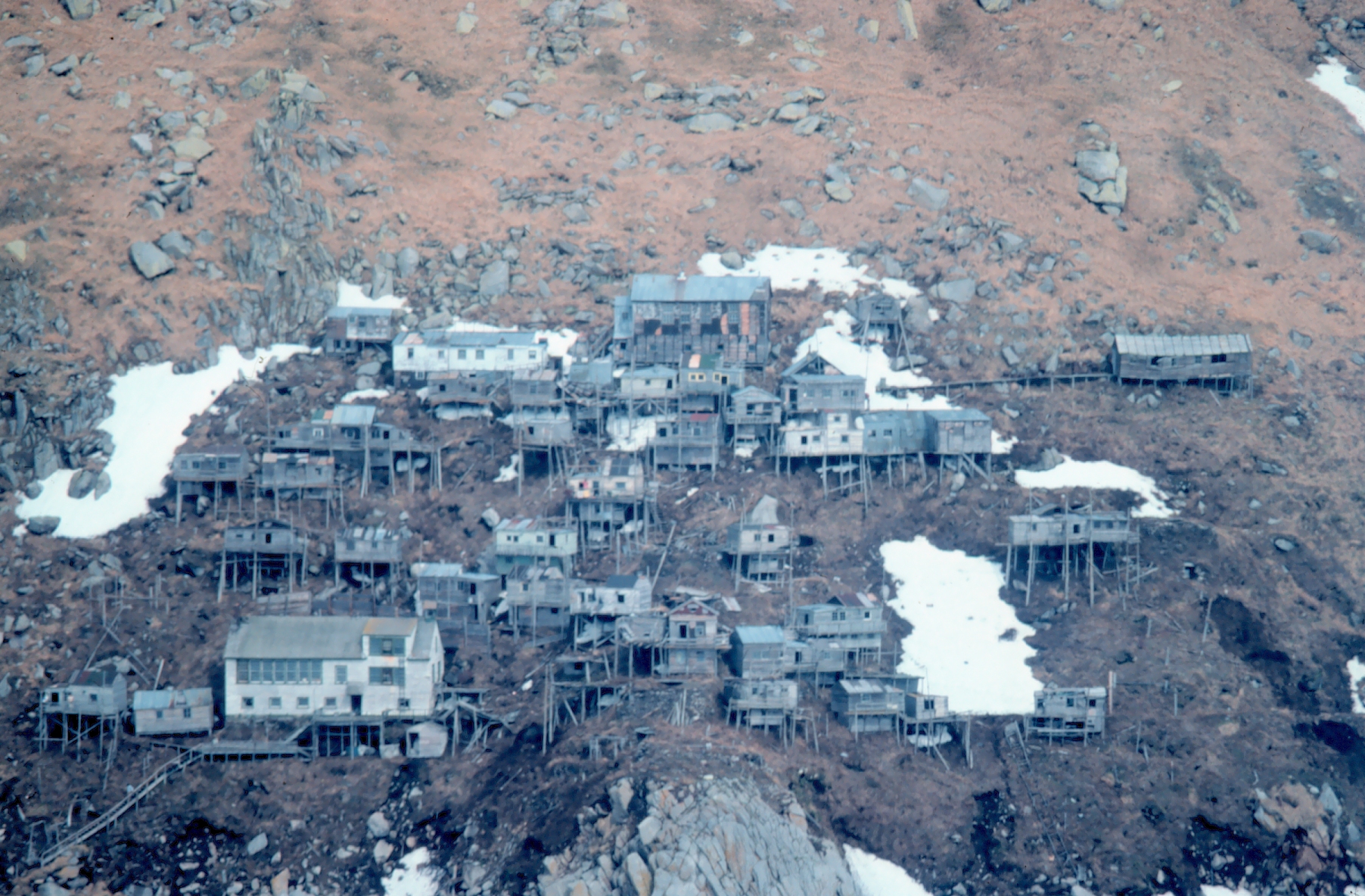.

Melted clock, Cass Technical High School: photo by Yves Marchand and Romain Meffre, from The Ruins of Detroit (Steidl), 2010
Man talking to supervisor
conflicted gestures of submission
at odds with hate in eyes
through the eccentric surface
of what he seems to be saying
shines a hidden burden
the repressed suffering
of the alienated subject
who unconsciously expresses
the unreconciled nature
of real life
right here in the administrative hallway
TC: Moment, from Disordered Ideas, 1987

Musical Tinkle (I): visual poem by Marie Wintzer, 11 September 2012
The icy night will change for the better gradually, just like
outstretched claws. The teeth will come out, shining brightly the
whole sky will purr too loudly. When spring comes trees and grasses,
flowers full bloom, the scene was covered in porridge smoke like this.
A vispo series inspired by
ancient Egyptian mythology on the creation of earth and sky. Geb was a
male god who represented the land of Egypt. As he lay on his back, the
folds of Geb’s body formed the mountains and valleys of the earth. Nut
was a female sky goddess who stretched overhead in a large arc,
forming the blue sky of clay or shining with stars at night.
Originally, the two gods lay close to each other, making it impossible
for any living thing to exist. Ra then ordered Shu, the god of the
air, to separate them, raising her so high that she began to tremble.

Musical Tinkle (II): visual poem by Marie Wintzer, 15 September 2012
So do many flowerpots come to you quickly, bringing you the black cat hobbling like a hushed crowd getting green and more bright after the coffee had run out.

Musical Tinkle (III): visual poem by Marie Wintzer, 17 September 2012
Your request will be late late late! The far side will be found later. The person you wait for will go singing through the air. Building a new house and removal are both visible in the gloom. Marriage, employment and traveling are on only three legs.

Detail from the Greenfield Papyrus (the Book of the Dead of Nesitanebtashru), depicting the air god Shu, assisted by the ram-headed Heh deities, supporting the sky goddess Nut as the earth god Geb reclines beneath: unknown Egyptian artisan, c. 950 BCE; photo by the British Museum, from What Life Was Like on the Banks of the Nile, edited by Denise Dersin, 1997; image by A. Parrot, 13 June 2010 (British Museum)

The Opening of the Mouth ceremony being performed before the tomb: page from the Book of the Dead of Hunefer: unknown Theban artisan, 19th Dynasty, c. 1300 BCE. The centrepiece of the upper scene is the mummy of Hunefer, shown supported by the god Anubis (or a priest wearing a jackal mask). Hunefer's wife and daughter mourn, and three priests perform rituals. The two priests with white sashes are carrying out the Opening of the Mouth ritual. The white building at the right is a representation of the tomb, complete with portal doorway and small pyramid. Both these features can be seen in real tombs of this date from Thebes. To the left of the tomb is a picture of the stela which would have stood to one side of the tomb entrance. Following the normal conventions of Egyptian art, it is shown much larger than normal size, in order that its content (the deceased worshipping Osiris, together with a standard offering formula) is absolutely legible. At the right of the lower scene is a table bearing the various implements needed for the Opening of the Mouth ritual. At the left is shown a ritual, where the foreleg of a calf, cut off while the animal is alive, is offered. The animal was then sacrificed. The calf is shown together with its mother, who might be interpreted as showing signs of distress (British Museum)

Weighing of the heart scene, with Ammit sitting: page from the Book of the Dead of Hunefer: unknown Theban artisan, 19th Dynasty, c. 1300 BCE. Hunefer is conducted to the balance by jackal-headed Anubis. The monster Ammit crouches beneath the balance so as to swallow the heart should a life of wickedness be indicated. Anubis conducts the weighing on the scale of Maat, against the feather of truth. The ibis-headed Thoth, scribe of the gods, records the result. If his heart is lighter than the feather, Hunefer is allowed to pass into the afterlife. If not, he is eaten by the waiting chimeric devouring creature Ammit, which is composed of the deadly crocodile, lion, and hippopotamus. In the next panel, showing the scene after the weighing, a triumphant Hunefer, having passed the test, is presented by falcon-headed Horus to the shrine of the green-skinned Osiris, god of the underworld and the dead, accompanied by Isis and Nephthys. The fourteen gods of Egypt are shown seated above, in the order of judges: photo by Jon Bodsworth, 8 December 2007 (British Museum)

Bridge in Macau: photo by Maitreya 8 (Mahesh Rao), 7 October 2011

Bridge in Macau (the haze is from industrial polllution): photo by Maitreya 8 (Mahesh Rao), 7 October 2011

Macau Tower: Flyovers in Macau: photo by Maitreya 8 (Mahesh Rao), 7 October 2011

Macau Tower: View from top: photo by Maitreya 8 (Mahesh Rao), 7 October 2011

Macau Tower: View from top -- as seen from the glass bottom: photo by Maitreya 8 (Mahesh Rao), 7 October 2011

Shinjuku lights, Tokyo: photo by Tinu Bao, 25 December 2006

Lights from above (view from the overpass), Tokyo: photo by Tinu Bao, 25 December 2006

Windows, Tokyo: photo by Tinu Bao, 25 December 2006

Chicago, night: photo by photoalvin (Alvin Shubert), 22 May 2009

Chicago, night: photo by photoalvin (Alvin Shubert), 22 May 2009

Shinagawa rooftop view, Tokyo: photo by Thomas Birke, 2008

View from Shinagawa Prince East Tower 17F, Tokyo: photo by Thomas Birke, 2010


Traffic congestion, Tokyo: photo by spiraldelight, 2 January 2012
What some like to call angst and to ennoble as an existential is claustrophobia in the world: in the closed system.
It perpetuates the spell as coldness between men, without which the calamity could not recur.
Anyone who is not cold, who does not chill himself as in the vulgar figure of speech the murderer "chills" his victims, must feel condemned.
Along with angst and the cause of it, this coldness too might pass. Angst is the necessary form of the curse laid in the universal coldness upon those who suffer from it.
It perpetuates the spell as coldness between men, without which the calamity could not recur.
Anyone who is not cold, who does not chill himself as in the vulgar figure of speech the murderer "chills" his victims, must feel condemned.
Along with angst and the cause of it, this coldness too might pass. Angst is the necessary form of the curse laid in the universal coldness upon those who suffer from it.
Theodor Adorno: excerpt from Negative Dialectics, 1966, translated by E. B. Ashton, 1973

The Dream of Future Administered House: IPv6 exhibition at PT Telkom, Bandung, West Java: photo by Ikhlasul Amal, 12 November 2010
Reality's
spell over spirit prevents spirit from doing what its own concept wants
to do when faced with the merely existent: to fly.
Because more tender and fleeting, spirit is all the more susceptible to oppression and mutilation.
As the placeholder of what progress could be above and beyond all progress, spirit stands askew to the progress that does take place, and this in turn bestows honor upon the placeholder.
Through less than complete complicity with progress, spirit reveals what progress is really up to.
Because more tender and fleeting, spirit is all the more susceptible to oppression and mutilation.
As the placeholder of what progress could be above and beyond all progress, spirit stands askew to the progress that does take place, and this in turn bestows honor upon the placeholder.
Through less than complete complicity with progress, spirit reveals what progress is really up to.

Scranton, Pennsylvania: Historic Electric City sign, restored in 2008, shines again: photo by Carol M. Highsmith, 27 May 2008 (Library of Congress)
Like every philosophical term, 'progress' has its
equivocations; and as in any such term, these equivocations also
register a commonality.
What at this time one should understand by 'progress' one knows vaguely, but precisely: for just this reason one cannot employ the concept roughly enough.
To use the term pedantically merely cheats it out of what it promises: an answer to the doubt and the hope that things will finally get better, that people will at last be able to breathe a sigh of relief.
For this reason alone one cannot say precisely what progress should mean to people, because the crisis of the situation is that precisely while everyone feels the crisis, the words bringing resolution are missing.
What at this time one should understand by 'progress' one knows vaguely, but precisely: for just this reason one cannot employ the concept roughly enough.
To use the term pedantically merely cheats it out of what it promises: an answer to the doubt and the hope that things will finally get better, that people will at last be able to breathe a sigh of relief.
For this reason alone one cannot say precisely what progress should mean to people, because the crisis of the situation is that precisely while everyone feels the crisis, the words bringing resolution are missing.

Rooftop bar at Soho House, New York City: photo by pvsbond, 5 June 2007
Today reflections of this kind come to a point in the contemplation of whether humanity is capable of preventing catastrophe.
The forms of humanity's own global societal constitution threaten its life, if a self-conscious global subject does not develop and intervene.
Theodor Adorno: excerpts from Progress, Lecture at Münster Philosophers' Congress, 22 October 1962, translated by Henry Pickford in Critical Models: Interventions and Catchwords, 1998

Deserted stilt village of Utivok, King Island, Bering Strait: photo by Capt. Budd Christman, 1978 (NOAA)



17 comments:
Your poem about the encounter in the administrative hallway reminds me of an incident from when I was in college, back in the twentieth century, albeit between equally-ranked colleagues.
Two professors pass in the hall in the psychology department. One, a behaviorist, says, "Good morning." The other, a psychoanalyst, thinks to himself, "I wonder what he meant by that."
mistah charlie, colleaguial of you to share.
The encounter recorded here took place in the corridors of a university extension school (night school by any other name).
A setting somewhere along the dismal borderline between
The Dream of Future Administered House and Cass Technical High School.
The old Cass Tech, that is, which burned down a few years ago (thus the top photo).
For an exclusive update from our Detroit Bureau, see the comment by Kent, here.
Great poem and accompanying images, Tom.
In the current multi-versity (thanks Clark Kerr for naming it), education just does not produce the revenue, even with the monstrous debt these kids are now expected to take on for the privilege of being there. So the "managers" try to squeeze water from a stone.
The real money is in various enterprises and intellectual property grabs. Those need management too.
The process of corporatization seems complete, and the insistence of that old alienation problem stated in your poem is a fact of life in the seminar room or the processed air cubicle in some venture capital business start-up park.
De Villo,
This place where I then worked (at, as is probably evident, minimal wage) was the bargain basement of Clark Kerr's multi-tiered system.
The place has since been, what's the word, evacuated, by the night school anyway, and the building in question only holds the ghosts of the old xerox machines.
At the top of the system is the much larger and, though the concrete is always encroaching, still leafier place just up the hill, now principally a r & d grant trough and special school for elite Asian students of privilege, who fill the coffers with those steep out-of-state fees.
Clark Kerr, who passed on ten years ago just up the freeway from where I croak these words, probably would have a hard time recognizing the place.
This is very difficult to read; particular moments do their reruns in the head. That such moments are common, that this is pretty much everybody's alienated subject cowering and hating, doesn't make it easier.
The gods getting the measure of each heart. Separation. Sacrifice. "The calf... who might be interpreted as showing signs of distress."
Adorno's unpicking of that old adolescent charm word, Angst, is tough work too. A closed system. Where's the way back to the fictions after that?
Tom, did you see this news story when it happened a while ago--a US boss blasted his French employees for their attitude. I immediately suspected that the French workers did not show the humility and cowed attitude the boss man was used to, a body language thing as in your poem. In France, of course, the average worker cannot be fired at whim like in the USA, and if they are fired they are probably in a better situation. So no fear evident when big boss walks the factory, and big boss doesn't get his power-sadism fix and throw a public fit.
http://www.npr.org/2013/03/01/173067804/u-s-boss-offers-blunt-critique-french-workers-give-fiery-response
A fiery tire pile that is indeed, Vincent. Interesting comment thread, there, too.
E. g: 'The only way for capitalism to work in factories of developed nations is for the workers to be incentivized by becoming part owners. In that way, their hard work will pay off. In my experience the "French Way" closely resembles the "American Way" at least before all our jobs were exported to China. Nobody wants to be treated badly by their bosses' tyranny or the unions' rule of "nobody gets ahead except through seniority", where hard work does not pay off. The inherent cynicism of Capitalism lies in its efforts to maximize profits at the expense of workers because factories can be easily moved to where workers wages are low. This was tried under NAFTA and it was discovered that Mexican workers worked the "Mexican Way", totally unacceptable to the capitalists. And now Chinese workers are rising up against horrid capitalist conditions there. Lastly, look to the example set by "Mondragon", a workers collective in Northern Spain, successful since 1958. At Mondragon workers are hired for life and if their jobs become redundant they are retrained and reassigned elsewhere in the organization.' (& c.)
And WB, talk about unpicking -- oh that Teddy -- a laugh riot! All the suavity of a Brillo pad!
Does this man have a future in show business?
Perhaps not, though in his telly appearance, his comments on Beckett and the reduction of modern people to Beckettian 'stumps' made me think of... well, of Flula, to be honest.
Gangnam Style
Meanwhile, from the same lower technical high school-tier of the celestial tombs:
The Pharaohs Sacrifice Themselves Before Her
Really though isn't it still much as Adorno originally said to Habermas way back when, there in the Frankfurt Extension School Cafeteria...Work it, Jürgen!
We’re born into a prison, albeit a beautiful one, that for a time seems not a prison. Then comes “the unreconciled nature of real life,” and perplexity, and then maybe hope . . . or just that vacant thousand-mile stare. What we call progress is self-betrayal. The blind hope that things will get better insures that things will never get better. It’s not the hope so much as the blindness. As Steve McQueen’s character says at the conclusion of The Sand Pebbles, “What happened? What the hell happened?”
Absolutely stunning images, top to bottom.
What a great collection again, Tom. And thank you so much for the feature of Musical Tinkle. The series was inspired by an exhibition I saw about the egyptian Book of the Dead. It was absolutely mesmerising. The text that goes with it is a result of chopping up fortunes drawn at a shrine here and words selected from a random book page. Bifidus Jones did the latter.
Fantastic urban photos, as usual, Tom, I think my favourites are the LA highway 2 and 5, wow! And the abandoned village, the very last one.
Gestures of submission at odds with hate in eyes. Oh yes, how often are things at odd in a work place. What one thinks is not what one (can) say and vice versa.
Which "way" rules at work? Probably the bosses's way, but then again. The french are not known for being role model employees to say the least, unions are very powerful in France etc, but still. I am French, my boss is from USA, and we work in Japan. I don't know which way we should call this.
This dispatch from Berkeley sent me to Pennsound to listen to a fire & brimstone reading of "The Multiversity" by Robert Duncan (Groundwork, Passages 21): "The many headed hydra" with shots at Clark Kerr, Bank of America and many others. Across the decades, I think it still works and the basic ideas still hold.
Clark Kerr said the true job of the University president is to ensure there are enough parking spaces for everyone.
What's that Jack Spicer line about nothing being inevitable "except parking lots"?
Thanks Tom, for getting me on the right post. Looks like under 80 degrees tomorrow so AC may not set the tone for Detroit's educational rebirth. We'd take another sweaty Milt Jackson in a heartbeat.
Robert had it right when he called that shot -- a "multi-headed hydra" indeed. Another way of saying it is that the university, over the past half century, has become a loose aggregate of entrepreneurial interests, all competing for the same objectives -- the parking lots, and of course the grants and benefits.
History, that gagged and bound town crier, would if it could tell anyone who still cared that Robert was pointedly excluded from the garden party of the hydra, never invited to teach at the university though he lived just a block away from the campus on Hearst Street. He did not forget this snub and eventually donated his archive to, of all places, Buffalo. Thus in a symbolic way turning his back on the hydra, which hardly noticed because it was busy scarfing up the town and cutting down the trees and paving-over paradise with one more parking lot for a glass and concrete laboratory.
The ghosts of those years of the desperate false dawn of protest-era "revolution" still hover in the air late at night, though few alive today remain sensible to the haunting. The tiny downtown Bank of America "plaza" (a circle of pavement not much larger than a picnic blanket) became for six months the sad bedraggled centre of Occupy Berkeley. Of course not much came of any of that, apart from the sullen grumbles of the displaced rough sleepers and the occasional afterparty pranks of the drunk students rolling past in late model cars roaring "fuck the ninety nine per cent!"
Last fall by the way the memory of the old Berkeley of protest and piss-offs was commemorated in the current honorific way that co-opts history into the false seamless wif-fi dream of the Administered Moment.
Approaching the Fiftieth Anniversary of the Free Speech Movement
That foreleg cut from the living calf and sacrificed to the gods of the underworld (WB's comment) reminds that the priests have always ruled the scene, and now the priests are developers and administrators, and the foreleg of the calf was what remained of the spirit of he living.
A heart lighter than a feather, if it were to be found in this landscape, would most likely be found sleeping rough in a shop doorway -- after eleven p.m. that is, when the ordinance forbidding sitting or lying on pavement is suspended for the passage through darkness... one last manifestation of the natural law, not yet amended or rescinded (though even as we speak there is doubtless a committee putting in a proposal to pave-over the night and put up an all-day parking lot in a bright spotless artificial sunshine mind bubble to replace it).
One probably must have been born or anyway come to approximate consciousness before some of the more recent American wars to appreciate the echoes here --
"What we call progress is self-betrayal. The blind hope that things will get better insures that things will never get better. It’s not the hope so much as the blindness. As Steve McQueen’s character says at the conclusion of The Sand Pebbles, 'What happened? What the hell happened?'"
What happened was that no job in the administered world was ever going to be a good job, the common people lost all the wars, nobody cared how the calf felt and the big winners from the techno-priest caste have taken the early retirement golden handshake at age 27 and are renting a large limo for the after-party, Gangnam Style.
Teddy Adorno hated pop music and the Culture Industry and if he were to return to life on these streets tonight he'd have a hard time finding a clear shop doorway in which to lay his tender overloaded little head, fragile container of all that obsolete circuitry of conscience.
Say it, brother.This one is golden, this post.
Hazen, it may be that one must be stuck up the creek without a paddle to note the toxic sepia content in Golden Pond these days.
Nobody wants to know, but the facts are available.
Now and then one of the big labs spews its toxic overburden into that creek. Nobody wants to know.
The creek, as it leaves
At the time of the BP spill, some townies chalked into the downtown pavement at the edge of one of the ongoing UC construction sites certain inconvenient facts as to the $500 million in BP black money accepted by the university as -- what' s the word? "Research and development funding"?
'UC BERKELEY/BP DEAL 500 million $ dollars to cut down the Amazon Rainforest BP OUT OF BERKELEY and the Gulf of Mexico Boycott BP and ARCO STOP DRIVING'
By morning the chalk message had been hosed away.
Next night, it reappeared.
Next day, hosed away again, & c.
My hunch is that the writing of this particular Book of the Dead, an orthography of "our" history that awaits a putative future to be deciphered, is not only on the walls, but on the streets, and that nobody will ever see it because all gazes are magnetized by those small hand-held plastic disinformation slabs.
Still bits of truth do occasionally pop up like weeds poking through the cracks in the pavement, before the effacement crews arrive.
Here for example, an excellent piece of real journalism, writ three years ago but at least as pertinent now as at the time it came out:
Who Runs the University of California?: Will Parrish and Darwin Bond-Graham, Counter Punch, 1 March 2010
A few excerpts:
'The State of California’s political elites and business leaders routinely use the language of crisis now whenever discussing the UC. In the past few decades, state funding of the university has suffered steady erosion. The UC now receives more funding than ever from private corporations and the federal government (the latter being in most instances pretty much the same as the former). Its various revenue streams range from student fees to several billion dollars in medical hospital revenue to private grants and donations, to its own hedge fund-like investments portfolio, to atomic bomb dollars from the Department of Energy.
'Thus, despite the state budget cuts, the UC’s overall revenue reached an all-time high of $19.42 billion in the 2009-10 academic year, and the Regents’ claim that the UC faces an “imminent and substantial” funding deficit is inaccurate, to say the least. According to both the university’s own financial documents and Moody’s bond rating agency, the university had access to over $8.3 billion in unrestricted investment funds it was holding in reserve at the time.
'The university has undergone a neo-liberal-style “structural adjustment” at the behest of the UC Regents, and this transformation has been accelerated during [Mark G.] Yudof’s tenure as president. Under the leadership of California’s economic elite, the UC has become the leading prototype for a "disaster capitalist university."
'Since the mid-1990s, administrative salaries have absorbed a dramatically increasing share of the university’s overall budget. According to a study by UC Berkeley Professor Emeritus of Physics Charles Schwartz, the number of UC administrative positions increased by an almost unbelievable 118 percent from 1996 to 2006, as compared with a 34 percent increase in faculty positions and 33 percent increase in students over the same period. As a result, there are currently 3,600 UC employees who make more than $200,000 a year, many of them through administrative positions.
_
'To understand fully why the University of California’s internal finances are being subjected to “economic shock therapy,” much like a Third World debtor nation under the thumb of the IMF, it’s necessary to know a bit about the history and function of the university’s power structure. Although it is nominally a public institution, the UC is not owned and governed by the State of California. Rather, it is the UC Regents who call all the shots. The Board of Regents is a corporate entity formed in 1879 for the explicit purpose of thwarting a populist social movement of small farmers who demanded that the the university become more responsive to their needs.
'During a tumultuous decade in California history," historian John Aubrey Douglass has written, "many saw the new University of California as serving the interests of the upper classes, focusing on classical ‘gentlemanly training’ and replicating the Yankee private institutions of the East. The detractors of the university demanded that, as an instrument of social and economic development, the university primarily serve the training and research needs of agriculture and industry, the stated ‘leading objective’ of the institution under statutory law."
'During the California constitutional convention of that year, a clique of mostly San Francisco-based financiers and industrialists managed to defeat the democratic demands of farmers and small business owners. The crowning achievement of this elitist coup was the establishment of the UC Board of Regents, a corporate entity that owns and operates the university. To maintain their power against all opposition the Regents gave themselves twelve-year tenures that are explicitly meant to insulate them from any political pressures. The UC thus became what Douglass calls "a fourth branch of state government."
'Since then, the leading sectors of the California economy have self-appointed individuals who represent their economic interests on the Board. The Regents mold UC policies in broad ways that benefit capital’s leading monopoly sectors. The current going price for an appointment – probably the most prestigious one at the governor’s disposal, it should be noted – seems to be $50,000, bare minimum. Give the Gov. this sum, and you too could be a Regent.
'Until relatively recently this meant that Regents would promote policies designed to build cutting edge economic sectors in and around the UC campuses, but they’d make sure to throw some of the university’s gravy to less sexy and profitable sectors of the economy. So for much of the Board’s history they’ve acted as Karl Marx’s idea of government: an executive board of the bourgeoisie, working if not for the interest of every industry, at least most of its monopoly sectors, and taking care not to destroy too many of the smaller fry. In recent years, the Board of Regents has become dominated by financiers, however. As with the economy at large, these wizards of hedge funds, credit markets, venture capital, real estate speculation, and all the other games played with billion dollar pots of money, have begun to run the university itself as a $19 billion dollar speculative bubble with ample opportunities for enormous growth through “volatility.” These new alpha Regents specialize in leveraged buyouts and privatization of publicly traded companies, and they have long practiced this same basic business philosophy on the university.
'The most prominent among this cadre has been Richard Blum. As we detailed in our last CounterPunch article, Blum’s five-decade career as a finance capitalist has been distinguished by the levels of skill and panache he has applied to the time-honored task of siphoning off public money into one’s own corporate coffers, as well as those of one’s financial and political allies. Blum, who is married to US Senator Dianne Feinstein, is one of the leading power-brokers in the Democratic Party within both California and the United States.
'Notably, it was Blum who virtually hand-picked President Yudof for UC President, having chaired the selection committee that oversaw Yudof’s appointment. At a March 2008 press conference heralding the Yudof hiring, the San Francisco Chronicle noted that Blum seemed “visibly ecstatic.” In April, the Chronicle quoted Blum again, saying of Yudof, "we disagree on almost nothing. If I were giving Mark a grade, I would give him an A-plus.”'
__
'The implicit conclusion is that the university’s complete subordination to capital is the primary reason for its existence, and that anything the UC could do for biotech, aerospace, real estate, and finance capital, it should do. In this way, the shift to privatization of the university’s finances, including student fees that are redirected to pay for campus construction projects, goes hand-in-hand with the efforts of state and business elites to render the university a wholesale servant of California’s neo-liberal economic machinery. Under this model, State funding is seen as akin to "local matching funds," sweetening the overall pot for the real investors, the main purpose being not to make the university affordable for students, but rather to expand the university’s physical footprint and build fancy new research centers that will create all manner of techno-gadgetry to inflate the next bubble.
'The UC Regents, in other words, have come to conceive of UC campuses almost entirely as incubators for a constellation of mini-Silicon Valleys: alliances of venture capitalists, real estate speculators, and high-tech entrepreneurs writ large upon large and overlapping swaths of California. It stands to reason that the UC’s leadership would be enamored of the region of the United States that is home to more millionaires per capita than anywhere else in the country, but which has also seen one of the sharpest declines in real wages among its working class. Silicon Valley also leads the way with the most temporary workers per capita, the highest level of economic inequity between genders, and the greatest concentration of toxic Superfund sites in the United States. Neo-liberalism in a nutshell.'
Post a Comment